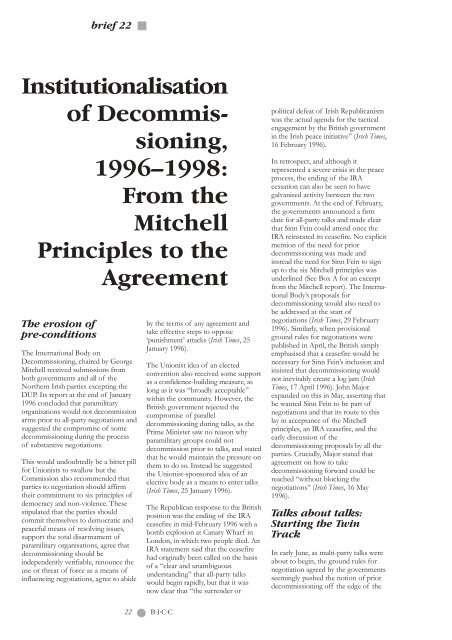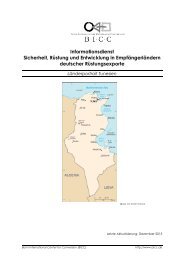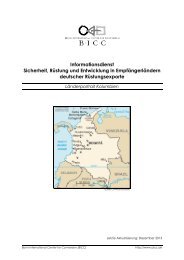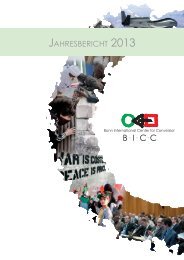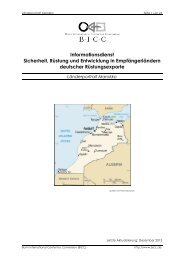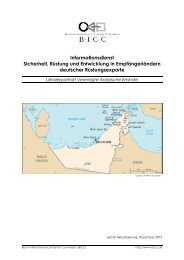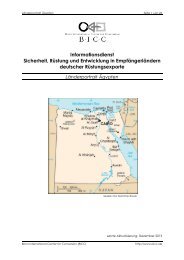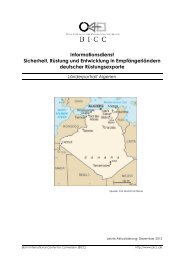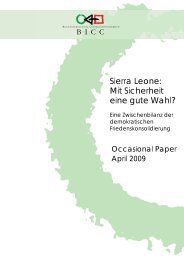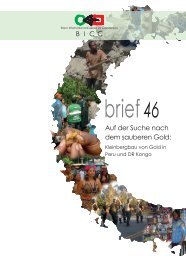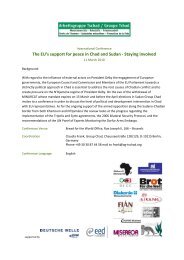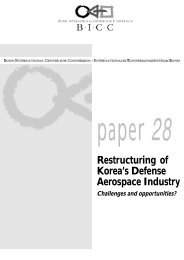English - BICC
English - BICC
English - BICC
You also want an ePaper? Increase the reach of your titles
YUMPU automatically turns print PDFs into web optimized ePapers that Google loves.
ief 22<br />
Institutionalisation<br />
of Decommissioning,<br />
1996–1998:<br />
From the<br />
Mitchell<br />
Principles to the<br />
Agreement<br />
The erosion of<br />
pre-conditions<br />
The International Body on<br />
Decommissioning, chaired by George<br />
Mitchell received submissions from<br />
both governments and all of the<br />
Northern Irish parties excepting the<br />
DUP. Its report at the end of January<br />
1996 concluded that paramilitary<br />
organisations would not decommission<br />
arms prior to all-party negotiations and<br />
suggested the compromise of some<br />
decommissioning during the process<br />
of substantive negotiations.<br />
This would undoubtedly be a bitter pill<br />
for Unionists to swallow but the<br />
Commission also recommended that<br />
parties to negotiation should affirm<br />
their commitment to six principles of<br />
democracy and non-violence. These<br />
stipulated that the parties should<br />
commit themselves to democratic and<br />
peaceful means of resolving issues,<br />
support the total disarmament of<br />
paramilitary organisations, agree that<br />
decommissioning should be<br />
independently verifiable, renounce the<br />
use or threat of force as a means of<br />
influencing negotiations, agree to abide<br />
by the terms of any agreement and<br />
take effective steps to oppose<br />
‘punishment’ attacks (Irish Times, 25<br />
January 1996).<br />
The Unionist idea of an elected<br />
convention also received some support<br />
as a confidence-building measure, as<br />
long as it was “broadly acceptable”<br />
within the community. However, the<br />
British government rejected the<br />
compromise of parallel<br />
decommissioning during talks, as the<br />
Prime Minister saw no reason why<br />
paramilitary groups could not<br />
decommission prior to talks, and stated<br />
that he would maintain the pressure on<br />
them to do so. Instead he suggested<br />
the Unionist-sponsored idea of an<br />
elective body as a means to enter talks<br />
(Irish Times, 25 January 1996).<br />
The Republican response to the British<br />
position was the ending of the IRA<br />
ceasefire in mid-February 1996 with a<br />
bomb explosion at Canary Wharf in<br />
London, in which two people died. An<br />
IRA statement said that the ceasefire<br />
had originally been called on the basis<br />
of a “clear and unambiguous<br />
understanding” that all-party talks<br />
would begin rapidly, but that it was<br />
now clear that “the surrender or<br />
22 B·I·C·C<br />
political defeat of Irish Republicanism<br />
was the actual agenda for the tactical<br />
engagement by the British government<br />
in the Irish peace initiative” (Irish Times,<br />
16 February 1996).<br />
In retrospect, and although it<br />
represented a severe crisis in the peace<br />
process, the ending of the IRA<br />
cessation can also be seen to have<br />
galvanised activity between the two<br />
governments. At the end of February,<br />
the governments announced a firm<br />
date for all-party talks and made clear<br />
that Sinn Fein could attend once the<br />
IRA reinstated its ceasefire. No explicit<br />
mention of the need for prior<br />
decommissioning was made and<br />
instead the need for Sinn Fein to sign<br />
up to the six Mitchell principles was<br />
underlined (See Box A for an excerpt<br />
from the Mitchell report). The International<br />
Body’s proposals for<br />
decommissioning would also need to<br />
be addressed at the start of<br />
negotiations (Irish Times, 29 February<br />
1996). Similarly, when provisional<br />
ground rules for negotiations were<br />
published in April, the British simply<br />
emphasised that a ceasefire would be<br />
necessary for Sinn Fein’s inclusion and<br />
insisted that decommissioning would<br />
not inevitably create a log jam (Irish<br />
Times, 17 April 1996). John Major<br />
expanded on this in May, asserting that<br />
he wanted Sinn Fein to be part of<br />
negotiations and that its route to this<br />
lay in acceptance of the Mitchell<br />
principles, an IRA ceasefire, and the<br />
early discussion of the<br />
decommissioning proposals by all the<br />
parties. Crucially, Major stated that<br />
agreement on how to take<br />
decommissioning forward could be<br />
reached “without blocking the<br />
negotiations” (Irish Times, 16 May<br />
1996).<br />
Talks about talks:<br />
Starting the Twin<br />
Track<br />
In early June, as multi-party talks were<br />
about to begin, the ground rules for<br />
negotiation agreed by the governments<br />
seemingly pushed the notion of prior<br />
decommissioning off the edge of the


